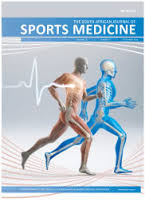Immediate effects of Global Active Stretching on strength and flexibility: Randomised Controlled Trial
DOI:
https://doi.org/10.17159/2078-516X/2024/v36i1a16618Abstract
Background: Global Active Stretching is a relatively recent yet little studied stretching method. It differs from the most popular methods by targeting muscle chains and integrating stretching with muscle contractions, which may eventually avoid the post-stretching reduction of strength that occurs in other methods.
Objectives: To verify the immediate effects of Global Active Stretching on muscle strength and flexibility in individuals with short hamstrings.
Methods: A single-blind randomised controlled trial was carried out on 30 volunteers with more than 20° in the active knee extension test, randomly assigned to three groups: the experimental group (Global Active Stretching exercise); the placebo group (Global Active Stretching initial position without stretching); and the control group (lying down). The active knee extension and fingertip-to-floor tests assessed hamstring and posterior chain flexibility. Hamstring and quadriceps strength were assessed using the peak torque evaluation in the Biodex System 4PRO®. Assessments took place before and immediately after the 15-minute intervention. The ANOVA and the paired t test were used (α = 0.05).
Results: The experimental group had a significant increase in flexibility in both the fingertip-to-floor test (8.3 cm) and the active knee extension test (6.3°) when compared to the placebo and control groups (p < 0.05), while no differences in strength were observed (p > 0.05).
Conclusion: Global Active Stretching immediately increased hamstring flexibility without significantly reducing muscle strength. Thus, individuals seeking to enhance their short-term flexibility can benefit from this programme in a single session without compromising performance.
Downloads
Downloads
Published
Issue
Section
License
Copyright (c) 2024 South African Journal of Sports Medicine

This work is licensed under a Creative Commons Attribution 4.0 International License.
The South African Journal of Sports Medicine reserves copyright of the material published. The work is licensed under a Creative Commons Attribution 4.0 (CC BY 4.0) International License. Material submitted for publication in the South African Journal of Sports Medicine is accepted provided it has not been published elsewhere. The South African Journal of Sports Medicine does not hold itself responsible for statements made by the authors.
How to Cite
- Abstract 336
- PDF 295






.png)